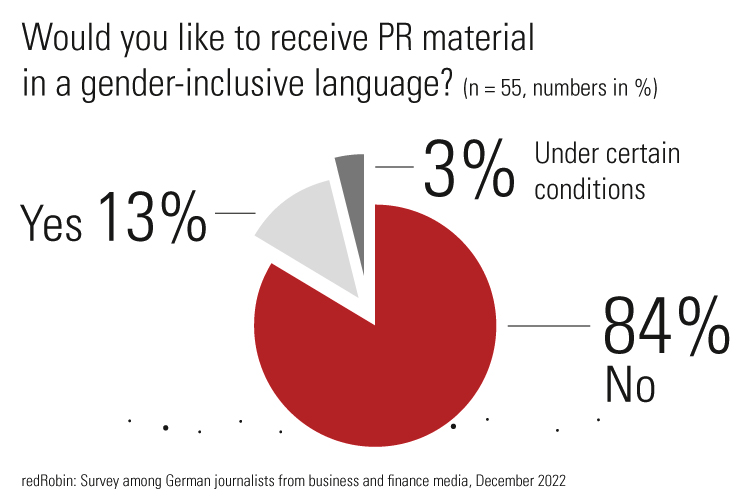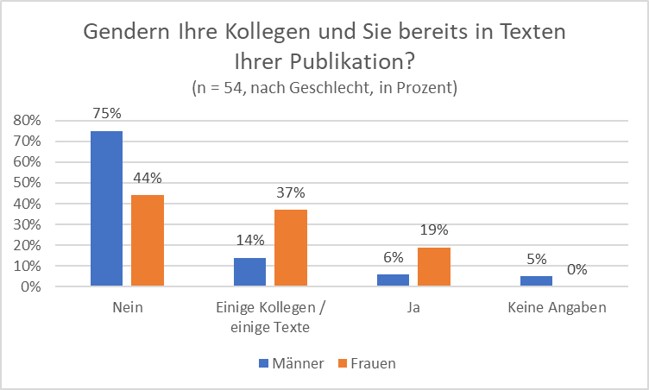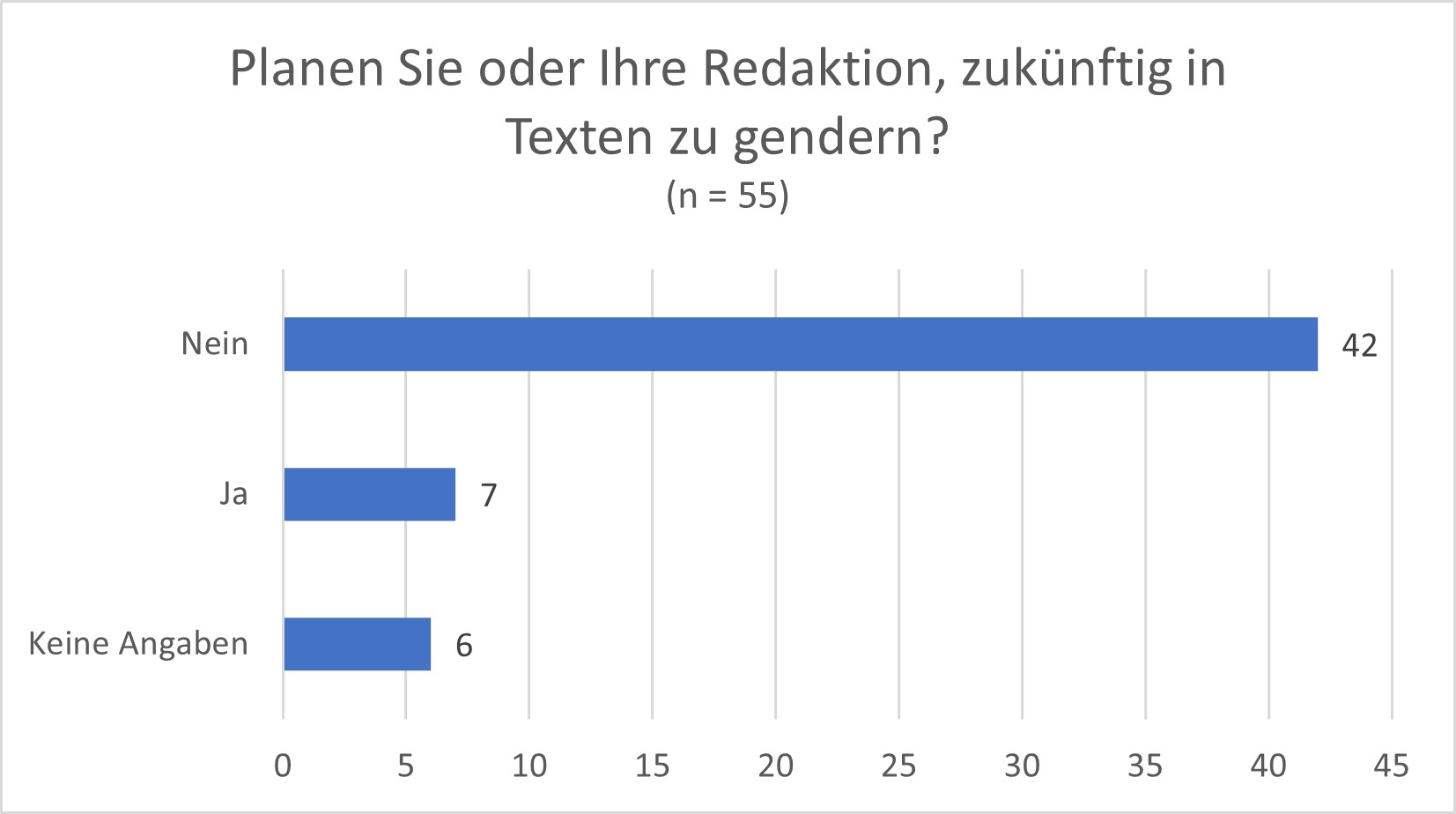Gender and German Grammar: Generic masculine remains preferred option of German journalists
Survey: German financial and business journalists prefer public relations information that is not gender-focused
- 84 per cent of all editors surveyed prefer press releases that use generic masculine nouns and pronouns rather than new, gender-focused styles
- 13 per cent of editors say they want to use gender-inclusive language in the future
- Survey among German-speaking financial and business publications confirms: Gender-inclusive language in the form of gender asterisks, colons or capital “I” is hardly used
Hamburg, 19. Januar 2023. Background information: German is a gendered language that includes three grammatical genders: masculine, feminine or neuter. When speaking or writing in more general terms, the masculine form of the noun, the generic masculine, is used as a gender-neutral form to address all. Much like in English: “The investors (being unspecific as to the group of investors being male, female or other) were surprised.”
Over the past years, German grammar has been increasingly criticized and demands have become more widespread to use an explicitly gendered language making females and other gender identities visible in all spoken and written German. Proponents of such a gendered language have suggested a range of ideas such as:
• The gender asterisk that places an asterisk before the female word ending – Investor*innen
• The colon, which follows the same principles – Investor:innen
• A capital “I” that marks the beginning of the female version of a noun starting with a capital letter – InvestorInnen
While a number of media, many addressing women and younger readers, have implemented one of these proposed solutions, the new rules are considered grammatically incorrect by organizations responsible for developing the German language. The majority of Germans also opposes this practice. As a result, the use of the so-called gender-inclusive language using special characters to highlight different gender identities has become a highly polarized debate in Germany and many companies feel insecure about how to proceed when writing press releases and articles for the media.
As redRobin has now found out, the preferences of editors working for finance and business publications are clear: German financial and business journalists have no interest in PR texts that are using special characters as a form of gender-inclusive language. This is the result of an online survey conducted by the PR agency redRobin among 55 editors in December 2022. With 84 percent (46 participants), the rate of rejection is high. Only 13 percent (7 participants) would like to receive such a form of gendered information, another two participants leave this decision to the sender of the press release.
The preference for non-gender-focused or traditional language is particularly high among men: 94 per cent of the participants would like to receive press releases without asterisks, colons or capital Is. Of the women surveyed, more than half (56 per cent) want to receive texts in standard grammar while 38 per cent of female editors prefer PR texts that use gender-inclusive language to refer to the diversity of possible gender identities.
In the texts of their own medium, according to their own information, only 5 out of 55 respondents (9 per cent) currently use gender-inclusive language, which corresponds to 19 per cent of the women surveyed and 6 per cent of the men. 67 per cent of all editors state that gender-inclusive language is not used in their own media, another 20 per cent state that specific, gender-related language is currently used by some colleagues or in some texts.
Among the respondents who want to give more space to different gender identities in their texts, a graphic solution with an asterisk or colon is the favored option, six out of eleven participants prefer this way. Four respondents prefer a written-out double designation such as "Mitarbeiterinnen und Mitarbeiter" ("female and male employees"). Only one participant thinks that the continuous use of participle constructions such as "Arbeitnehmende" ("people working for a company") or "Anlegende" ("people making investments") serves the purpose of making the German language more inclusive.
The generic masculine will also remain the preferred option of German journalists in the future: According to three quarters of respondents (76 per cent), their publications do not plan to put a stronger linguistic focus on gender identities, only 13 per cent say this is planned.
German financial media: Mention of different genders only when addressing the readers
Accompanying the survey, redRobin also analyzed the current language used by ten publications in the financial and business press in December 2022. The sample confirms the result of the survey that the generic masculine continues to be the linguistic norm. Gender-specific wordings are mainly found in editorials and commentaries where "Leserinnen und Leser" („female and male readers”) or "Anlegerinnen und Anleger" (“female and male investors”) are directly addressed. Participle constructions are also rarely used at present. Graphic approaches to implement gender-inclusive language with asterisks or colons were only found in leading business newspaper Handelsblatt and only in the rubrication: Here, the page on which company founders are portrayed is now called “Unternehmer:in des Tages".
Communication expert advises: Address the target group appropriately
"Whether or not language should be gendered is a highly emotional topic in Germany. We see this not only in conversations with clients and journalists, but also in discussions among our team members," says Susanne Wiesemann, managing partner at redRobin. The communications expert and her colleagues work for companies from sectors such as finance, real estate and technology. Increasingly, these companies, too, are looking for ways to deal with this topic in their media relations in the future.
"How people position themselves with regards to gender-inclusive language is a very personal question. Interpretations such as grammar being fair or unfair to some gender identities does not help the matter at hand. It also misses the point," said Wiesemann. "Whether companies really grant equal rights and opportunities is not primarily shown in language, but in practice."
Wiesemann advises her clients to communicate in a way that is tailored to the needs of the target group: "The financial press is not an arena of gender politics and does not want to become one, as our survey clearly shows. If you as a company want to position yourself here, you can do so by having more diversity in terms of the selected representatives, such as a female CEO, a female fund manager or by quoting a non-binary expert." In internal communications or when addressing potential employees, on the other hand, it might make sense for companies to use a language that is more oriented towards diversity and gender identity.
Council for German Orthography against use of special characters
More and more companies are feeling the need to take a stand on this topic: According to a survey by magazine WirtschaftsWoche in the summer of 2022, 64 per cent of DAX-40 companies have already written an employee guideline on how they deal with the issue, if, how and with which target groups they can, should or must communicate in which way. There is currently no majority in the German population for this linguistic change: according to a 2021 poll by Infratest Dimap for newspaper Welt am Sonntag, 65 per cent of those surveyed reject the idea of changing the language.
The Council for German Orthography has also advised against the inclusion of special characters as tools to highlight different gender identities. The Council had most recently reiterated in March 2021 that language should enable essential facts and core information to be easily conveyed. The use of special characters to indicate different gender identities contradicts the goal that language should be factually correct, understandable, readable and transferable to different German language areas.
The survey by redRobin was conducted from 13th to 22nd December 2022. A total of 55 journalists from the German-speaking financial and business sectors filled out the online questionnaire, including 37 men and 16 women.




